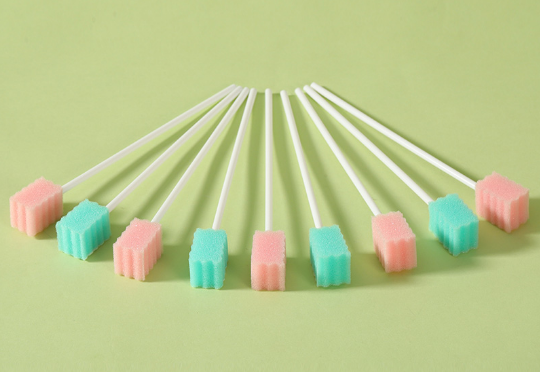Soft Toothbrushes vs. Foam Swabs for Oral Care
When it comes to oral care, the tools we use play a vital role in maintaining dental hygiene. Two commonly used items for oral care are soft toothbrushes and foam swabs, each serving distinct purposes and catering to specific needs. Let’s delve into the features, benefits, and best uses of these two tools to understand their roles in oral hygiene.
Foam Swabs:
Foam swabs, on the other hand, serve a different purpose in oral care. These swabs have a foam tip attached to a handle and are often used for various oral care tasks beyond standard teeth brushing. Oral sponges or foam swabs are used to maintain oral hygiene in hospital and long-term care patients who cannot tolerate brushing with a regular toothbrush. They are particularly useful for individuals with limited mobility, those undergoing medical treatments, or individuals in hospitals or care facilities.
Benefits:
1. Gentle Application: Foam swabs are soft and gentle, making them suitable for delicate oral areas, such as the inside of the mouth, cheeks, and tongue.
2. Precise Cleaning: They can reach areas that might be difficult to access with a regular toothbrush, aiding in cleaning hard-to-reach spots.
3. Versatility: Apart from oral hygiene, foam swabs are also used for applying medication or moisturizers to specific oral areas.
Best Uses:
- Patients with Limited Mobility: Ideal for individuals who cannot use regular toothbrushes due to physical limitations or medical conditions.
- Oral Care in Medical Settings: Often used in hospitals or care facilities to maintain oral hygiene for patients unable to perform regular brushing.
Soft Toothbrushes:
Soft toothbrushes are foundational tools for daily oral hygiene. They come with bristles specifically designed to clean teeth effectively without causing damage to the gums or enamel. These brushes typically have nylon bristles of varying lengths and textures to reach different areas of the mouth and remove plaque and food particles. The softness of the bristles ensures gentle cleaning without causing irritation or abrasion to the gums.
Benefits:
1. Effective Cleaning: Soft toothbrushes efficiently remove plaque and debris from the teeth's surface and along the gum line, helping prevent cavities and gum diseases.
2. Gentle on Gums: The soft bristles are gentle on gums, reducing the risk of causing damage or abrasions, making them suitable for individuals with sensitive gums.
3. Versatility: They come in various sizes and shapes, catering to different preferences and mouth sizes.
4. Daily Use: Recommended for daily use as part of a regular oral hygiene routine.
Best Uses:
- Twice-Daily Brushing: Soft toothbrushes are ideal for brushing teeth at least twice a day, following the recommended two-minute duration each time.
- Maintaining Oral Health: They are excellent for maintaining overall oral health by removing plaque and preventing dental issues.
Choosing between a soft toothbrush and foam swabs depends on individual needs and circumstances. For most people, a soft toothbrush remains the primary tool for daily oral hygiene, offering comprehensive cleaning without causing harm to the teeth or gums. However, foam swabs for oral care serve as excellent supplementary tools, especially for individuals with specific medical conditions or limited mobility, allowing for precise and gentle cleaning in hard-to-reach areas.
Conclusion
In conclusion, both soft toothbrushes and foam swabs play crucial roles in oral care, offering unique benefits and serving different purposes. Incorporating these tools appropriately into an oral hygiene routine ensures comprehensive care and maintenance of oral health for various individuals and situations.



Comments
0